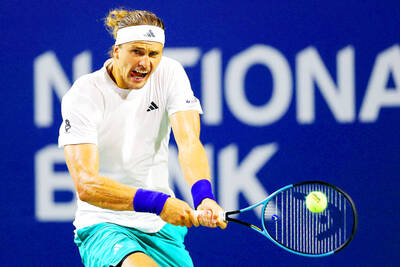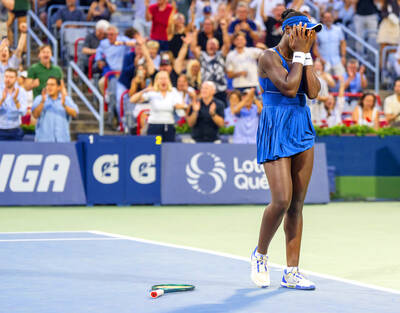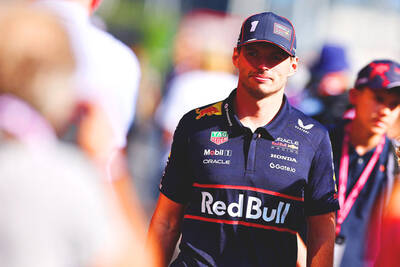Beneath soccer's image of fitness and heartiness lies a less healthy reality, say medical investigators, who have found that for fragile spectators, a match can quite literally be a sudden-death playoff.
Doctors eyeing the Euro 2008 championship are bracing for a rise in emergency calls, cardiac arrests, wife beatings, punchups, drunken driving, depression, self-harm and even suicide.
“The more important the game, the greater the risk” says Ute Wilbert-Lampen, an investigator at the Munich University Clinic in southern Germany.
During the 2006 World Cup, her team discovered, cardiac arrests and palpitations among men in the greater Munich area more than tripled compared with the same period over three preceding areas.
Among women, the rate was double.
The number of cases surged when Germany played and peaked massively in the quarter-finals against Argentina, which the national team won, and in the semis against Italy, which it lost.
Both games were decided after extra time and the penalty shootout, which previous research has already fingered as a risk.
The figures are so alarming that some experts urge people with a potential risk to take stress receptor blockers, aspirin and statins, or even consider behavior therapy to calm down before hitting the sofa.
“We advise our patients not to watch important matches after a heart attack or if they are considered to be a high cardiac risk,” said Herve Douard, a cardiologist at the University Hospital Clinic in Bordeaux.
Researchers at the University of Birmingham, in central England, suggested in all seriousness that penalty shootouts be abolished “on public health grounds” after discovering that the number of heart attacks in Britain rose by 25 percent on the day England lost to Argentina on kicks in the 1998 World Cup.
Another threat to life and limb is from domestic violence.
According to figures by Britain’s Home Office, cases of wife beatings in England and Wales surged on the day of each of England’s five games in the 2006 tournament, with a high of 31 percent over the normal rate.
Although it may seem counter-intuitive, soccer-related violence seems to rise when a team wins, rather than when it loses, says Vas Sivarajasingam of Cardiff University Wales, who looked at the city’s emergency room admissions when the national side played.
Every big sporting fiesta brings with it a rise in beer-fuelled car smashups, of accidents or acts of self-harm involving high-spirited or depressed fans.
One extreme example occured in February 2005, when a celebrating Welsh fan cut off his own testicles to fulfill a pledge after his side beat England in the Six Nations rugby tournament.
Then there are the longer-term health problems of the soccer fan’s couch-potato lifestyle: non-stop boozing and snacking on starchy, fatty, salty or sweet foods.
Alcoholism, obesity, diabetes and heart disease are entrenched problems in Europe, and Jeff Collin, a University of Edinburgh lecturer, blasts UEFA for accepting tournament sponsorship from Carlsberg, Coca-Cola and McDonald’s, who sell beer, soda and hamburgers.
“It’s fundamentally inappropriate for such events to be used primarily as a means of advertising unhealthy products, particularly when you take into account the scale of public subsidy that’s typically associated with them,” he said. “Using public money to advertise McDonald’s doesn’t seem a particularly appropriate stategy for promoting public health.”

Top seeds Alexander Zverev of Germany and American Coco Gauff on Tuesday advanced to the third round of the Canadian Open after both players were pushed hard by their opponents. World No. 3 Zverev, playing in his first match since his first-round loss at Wimbledon, was far from his best, but emerged with a 7-6 (8/6), 6-4 win over Adam Walton under the lights in Toronto. Momentum shifted firmly in Zverev’s favor when he won a 52-shot rally in the first set tiebreak and he sealed the win on a double fault by the Australian in the second set. “It was a very

Canadian teenager Victoria Mboko upset top-seeded Coco Gauff 6-1, 6-4 on Saturday night to reach the National Bank Open quarter-finals. “Your support was incredible,” Mboko told the crowd in French after a chorus of “Ole, Ole, Ole” chants echoed around the venue. “I’m really happy to win today ... It’s incredible. I’m so happy to beat such a great champion.” Gauff dropped to 2-3 since winning the French Open. She followed the major victory with opening losses in Berlin and Wimbledon, then overcame double-fault problems to win two three-set matches in Montreal. Gauff had five double-faults on Saturday after having 23 in

Taiwan’s top women’s badminton doubles duo, Hsieh Pei-shan (謝沛珊) and Hung En-tzu (洪恩慈), achieved a straight-sets victory over Japan’s Kaho Osawa and Mayui Tanabe at the Badminton World Federation (BWF) Super 300 Macau Open on Sunday. The Taiwanese pair won the final 21-18, 21-12, marking the duo’s second title this year after their win at the BWF Super 300 Taipei Open in May. The match on Sunday was their first encounter with the Japanese duo, ranked No. 63 in the world. Hsieh and Hung, ranked No. 12, began the opening game well. Hung, who plays left-handed, performed strongly at both the net and the

Formula 1 champion Max Verstappen on Thursday said that he is staying with the Red Bull team next year, ending months of speculation over his future. “Some people just like to stir the pot, some people just like to create drama, but, for me, it’s always been quite clear, and also for next year,” the four-time champion said ahead of the Hungarian Grand Prix. “I’m discussing with the team already the plans — the things that we want to change for next year, so that means that I’m also staying with the team for next year,” he said. Verstappen has a contract with